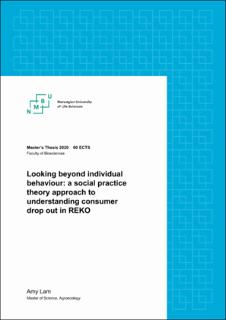Looking beyond individual behaviour: a social practice approach to understanding consumer drop out in REKO
Master thesis
Submitted version
Permanent lenke
https://hdl.handle.net/11250/2660690Utgivelsesdato
2020Metadata
Vis full innførselSamlinger
- Master's theses (IPV) [240]
Sammendrag
The current food system employs an industrialised model of agriculture that has been connected to climate change, loss of biodiversity, environmental degradation, and the erosion of rural livelihoods. It is characterized by a concentration of power in the companies involved in inputs and food trade, processing, and distribution, as well as retailing. All of this has led to decreased farmers’ choice, power and economic livelihoods at the food production end, and decreased consumers’ choice in the food consumption end of our food system. In 2013, an alternative food network called REKO emerged in Western Finland and has spread to Nordic countries and beyond. Using Facebook to facilitate sales, it connects farmers to consumers with no intermediaries. Finland, being the most mature market for REKO, has seen REKO peak, and is now facing challenges of getting consumers to come out on a regular basis. Using a social practice theory approach, this study explores why few consumers engage in REKO in the long run. The study was conducted using the REKO Vaasa circle as single holistic case study. Semi-structured interviews and shop-alongs were conducted with former REKO shoppers to understand the sociocultural meanings behind food consumption and how that interacts with the materiality of food provisioning and human agency. The study found that while REKO is an AFN in its conceptualisation, it is embedded with the overall food provisioning system with retail and the two entities continually interact to shape each other. Norms for how consumers shop are set by retailers, and retailers are influenced in their product offerings by REKO and have co-opted REKO offerings. Furthermore, competing life practices make it challenging to engage in the REKO shopping practice in the long run. As such, REKO needs to continually evolve and engage with consumers to main relevant and resilient. These findings can support other REKO circles as the model continues to grow and expand.

